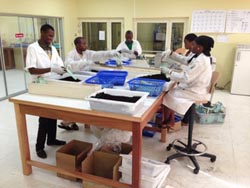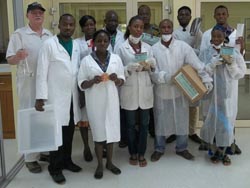NoduMax is a new legume inoculant for soyabean recently developed at the IITA Business Incubation Platform and the N2Africa Project. The inoculant contains >1 x 109 Bradyrhizobium japonicum strain USDA 110 per g and is packaged in an alumino-laminate bag along with gum arabic adhesive and user instructions. A series of 28 product runs resulted in 79% acceptance of this adopted threshold.
During production, rhizobia in mature cultures increased by 66% upon dilution in 0.1 strength YMB "jump broth" but then suffered and 79% died off immediately upon mixing with dried, powdered peat. During a 10 day curing interval rhizobia increased ten-fold again. But, problems were encountered with sterilizing the peat carrier. It contained about 25,000 unwanted contaminants per g that were reduced by only 64% during autoclaving. These contaminants increased throughout inoculant preparation and only 38% of the finished product batches contained fewer than 1 x 106 CFU per g. Plans are under way to treat the carrier by gamma irradiation in Ghana.
  |
Left: Packing room team at IITA
Right: NoduMax team May 2014 |
Each package of NoduMax costs about $1.03 to produce with carrier and broth the least expensive, and packaging and gum arabic adhesive the most expensive components. With manufacture’s and retailers’ profits, it is expected to sell for about $2.60 per packet, sufficient to inoculate 10 to 20 kg of soyabean seed. The current product compares favorably to inoculants produced in other countries where product quality is closely regulated. Product development and efficacy testing continues, and the first packages of NoduMax intended for sale are now being produced. COMPRO II is assisting in registering the product for commercial distribution in Nigeria. The first peak production run is just starting and we plan to produce 16 tons of soyabean inoculant by April 2015. Anyone with ideas on how to reduce the large rhizobial die off during mixing is encouraged to contact Paul Woomer at plwoomer@gmail.com.
Paul Woomer and Dianda Mahamadi
